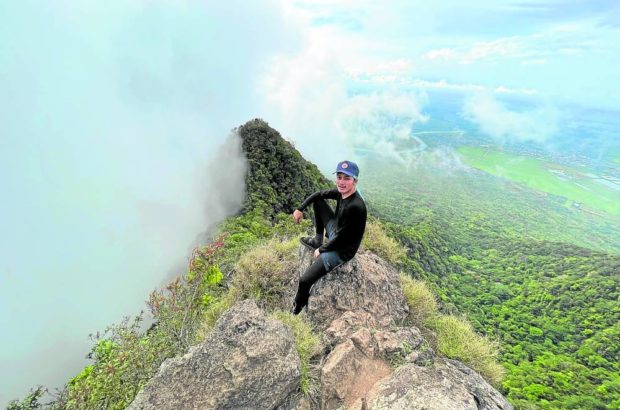The rise of the eco-conscious traveler

The COVID-19 pandemic left no stone unturned as it raged around the world. As people have been cooped up in their homes for nearly two years, the tourism sector has taken a huge hit.
But with health protocols slowly easing and tourist spots reopening, more people are looking to travel, especially during the holidays.
Piolo Veluz, a digital content producer, travels not only for work but to keep his sanity intact. “The pandemic made me realize [I need] to travel as much as I can and do it for self-healing, for my mental health and treat it as a priceless investment,” he says.
Veluz secures documents and permits and pays fees to hike in the mountains, mostly taking off the beaten path.
The 23-year-old’s most recent trip was to climb Mount Apo in Mindanao.
“[A]side from tourism opportunities, they are also exporting their own crops! It’s just so good to know that they are not taking advantage of nature and they still believe that Mount Apo is a living thing that helps them thrive,” he says.
For Veluz, sustainable tourism can be achieved by spreading the word about what the rural areas have to offer, and always consuming local products and services.
“It’s always by promoting them organically. If you know someone who wants to visit their place, refer or inquire from their local tour organizers and make sure to avail of their services and local products as much as possible,” he explains.
Traveling gives Veluz a sense of accomplishment and a chance to discover what the Philippines has to offer.
“I want to be there with no idea at all of what they have to offer,” he says. “Going to newly discovered places will give you a different perspective and feeling of accomplishment. It’s like unearthing your own destination and imprinting your identity on that location.”
Empowering trips
More and more Filipinos are becoming “conscious travelers” who want to contribute socially and economically to locals, and immerse themselves into the communities they visit.
A study by travel platform Airbnb and think tank Economist Impact on 4,582 travelers from nine countries—including Australia, Japan, Malaysia, Singapore, South Korea, Taiwan, Thailand and the Philippines—shows that tourists are looking for more than just beautiful scenery and relaxation for their next trip.
“Following the pandemic, travelers are thinking more about the implications of their travel choices and decisions,” says Pratima Singh, senior manager for policy and insights at Economist Impact. Based on the study, more than 80 percent of Filipinos say it is important that their travel creates a positive impact for the locals.
About 75 percent travel as a way to immerse themselves into communities and culture. More than 70 percent are more inclined to contribute to the local economy and will factor this into where they travel and how they spend their money, recognizing that communities are in need of economic recovery.
About 76 percent of travelers say they will be more conscious when it comes to familiarizing themselves with what’s important to the communities they are visiting and how they can make a contribution.
Embracing sustainability
More than 60 percent are willing to build sustainable tourism practices into their holiday plans. “As demonstrated by our survey findings, we’re seeing a trend where people are attempting to make their travel decisions more sustainable—economically, culturally and environmentally—and hoping to have a more positive impact by benefiting local communities,” Singh adds.
Travelers are most willing to forgo comforts and luxuries if they can support sustainable tourism outcomes. They are also willing to pay a premium for an experience that supports sustainable tourism and avoid destinations faced with sustainability challenges.
Over half of Filipinos plan to travel more frequently to rural destinations that are not currently popular while almost half say it is important that they are not contributing to issues such as overtourism.
“In the wake of the disconnection and economic hardship brought by the pandemic, people are becoming increasingly thoughtful and deliberate about how they can use travel to make a positive contribution to the communities they’re visiting. They’re thinking deeply about how they can put their tourist dollars to best use and economically empower towns and rural communities that have struggled. And they’re looking to immerse themselves in these communities and forge meaningful connections, while also minimizing any unintended negative impacts,” says Mich Goh, Airbnb’s head of public policy for Southeast Asia.
About 60 percent also plan to take “workcations” when they can while 62 percent plan to allocate more of their travel budget for spending within the country.
“Just as the travel revolution is inspiring people to embrace flexibility and reimagine the ways they live and travel, so too is it spurring on the rise of the conscious traveler,” Goh says.
